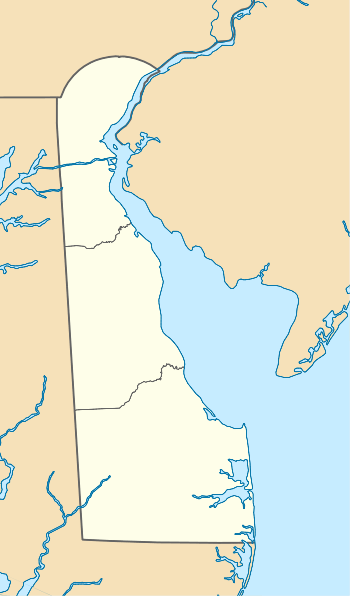Bear, Delaware
| Bear, Delaware | |
|---|---|
| CDP | |
 Location in New Castle County and the state of Delaware. | |
 Bear  Bear Location within the state of Delaware | |
| Coordinates: 39°37′13″N 75°41′5″W / 39.62028°N 75.68472°WCoordinates: 39°37′13″N 75°41′5″W / 39.62028°N 75.68472°W | |
| Country | United States |
| State | Delaware |
| County | New Castle |
| Area | |
| • Total | 5.7 sq mi (14.9 km2) |
| • Land | 5.7 sq mi (14.9 km2) |
| • Water | 0.0 sq mi (0.0 km2) |
| Elevation | 69 ft (21 m) |
| Population (2000) | |
| • Total | 17,593 |
| • Density | 3,063.4/sq mi (1,182.8/km2) |
| Time zone | Eastern (EST) (UTC-5) |
| • Summer (DST) | EDT (UTC-4) |
| ZIP code | 19701 |
| Area code(s) | 302 |
| FIPS code | 10-04130 |
| GNIS feature ID | 0216026 |
Bear is a census-designated place (CDP) in New Castle County, Delaware, United States. The population was 17,593 at the 2000 census.
Originally a small crossroads in a rural area, About 14 miles south of Wilmington, the area supported small farms growing mainly corn and cattle. In the late 1980s and 1990s Bear became a popular location for the construction of sprawling housing developments and shopping centers along U.S. Route 40. Much of Bear runs along U.S. Route 40, and extends to approximately Delaware Route 896. Bear is not an incorporated municipality or strictly delineated area in the county, but instead a general reference to the collection of communities in the US ZIP Codes 19701-19702.
History
According to common legend, the name "Bear" originated from a tavern located along the roadway from Wilmington to Dover, Delaware (at the intersection now formed by U.S. Route 40 and Delaware Route 7), whose sign was decorated with the image of a large bear.
Throughout the years, Bear has had a history of being centered around shopping centers and neighborhoods located along U.S. Route 40.
White Hall was listed on the National Register of Historic Places in 1990.[1]
Geography
Bear is located at 39°37′13″N 75°41′5″W / 39.62028°N 75.68472°W (39.620362, -75.684776).[2]
According to the United States Census Bureau, the CDP has a total area of 5.7 square miles (15 km2), all of it land.
Bear is located about 14 miles south of Wilmington and about 44 miles from Philadelphia, Pennsylvania
Demographics
As of the census[3] of 2000, there were 17,593 people, 6,027 households, and 4,544 families residing in the CDP. The population density was 3,063.4 people per square mile (1,183.4/km²). There were 6,265 housing units at an average density of 1,090.9 per square mile (421.4/km²). The racial makeup of the CDP was 66.91% White, 26.79% African American, 0.22% Native American, 2.03% Asian, 0.02% Pacific Islander, 1.78% from other races, and 2.25% from two or more races. Hispanic or Latino of any race were 5.50% of the population.
There were 6,027 households out of which 46.6% had children under the age of 18 living with them, 51.4% were married couples living together, 18.2% had a female householder with no husband present, and 24.6% were non-families. 18.2% of all households were made up of individuals and 2.5% had someone living alone who was 65 years of age or older. The average household size was 2.92 and the average family size was 3.30.
In the CDP the population was spread out with 33.0% under the age of 18, 8.5% from 18 to 24, 36.7% from 25 to 44, 17.7% from 45 to 64, and 4.1% who were 65 years of age or older. The median age was 33.8 years, with a median of 32.8 for natives and 34.8 for foreigners. For every 100 females there were 95.2 males. For every 100 females age 18 and over, there were 90.7 males.
The median income for a household in the CDP in 2014 was $60,647. Males had an average income of $62,474 versus $48,706 for females. The per capita income for the CDP was $20,715.[4] The largest demographic living in poverty were "Males from ages 6-11" and 13.2% of the population was below the poverty line which is lower than the national average of 15.5%.[5] Additionally, 6.7% of those under age 18 and 7.3% of those age 65 or over were below the poverty line.
Bear has a large population of citizens whom have served in the military. The most common service period was (1) Vietnam, (2) The Gulf War in the 1990s, and (3) The Gulf War in the 2000s.[6]
Education
Education for Bear is provided by three public school districts and numerous private schools. The public districts are: Colonial School District, Christina School District, and Appoquinimink School District, which also serves Middletown.
The most prominent private schools located in Bear include: Caravel Academy (1144 students), Red Lion Christian Academy (659 students), Tall Oaks Classical School (225 students), Fairwinds Christian School (224 students), and Glasgow Christian School (199 students). Delaware has one of the highest rates in the nation of students attending private school.[7]
No major universities are based in Bear, but Wilmington University's primary sports complex is located along U.S. Route 40.
Economy
In Bear, the most common industries are (1) Healthcare and Social Assistance, (2) Finance and Insurance, and (3) Retail Trade. Interestingly, the highest paid are (1) Utilities, (2) Transportation and Warehousing, and (3) Professional, Scientific, Tech Services. [8]
The median property value in Bear is $173,200, with the largest share of property values in housing units that fall within $200,000-$250,000. 68.5% of housing units are occupied by their owner, which is higher than the national average.[9]
Diversity
The most common country of origin is (1) Mexico, (2) India, and (3) China, and has a considerably high number of people that were born in Kenya. Also, 92.4% of the population of Bear are U.S. citizens.[10]
Additionally, Spanish is the most spoken non-English language, followed by African and Arabic.[11]
Transportation
The most heavily used mode of transportation are vehicles. The largest share of households have two cars, followed by three cars. [12]There are state-led bus services and on-call DART services for people with disabilities.
The average commute time to work is approximately 26.4 minutes, which is more than the state and national average. Most of these drivers are alone during their commute (82.6%).[13]
References
- ↑ National Park Service (2010-07-09). "National Register Information System". National Register of Historic Places. National Park Service.
- ↑ "US Gazetteer files: 2010, 2000, and 1990". United States Census Bureau. 2011-02-12. Retrieved 2011-04-23.
- ↑ "American FactFinder". United States Census Bureau. Archived from the original on 2013-09-11. Retrieved 2008-01-31.
- ↑ https://datausa.io/profile/geo/bear-de/
- ↑ https://datausa.io/profile/geo/bear-de/
- ↑ https://datausa.io/profile/geo/bear-de/
- ↑ http://www.privateschoolreview.com/delaware/bear
- ↑ https://datausa.io/profile/geo/bear-de/
- ↑ https://datausa.io/profile/geo/bear-de/
- ↑ https://datausa.io/profile/geo/bear-de/
- ↑ https://datausa.io/profile/geo/bear-de/
- ↑ https://datausa.io/profile/geo/bear-de/
- ↑ https://datausa.io/profile/geo/bear-de/
